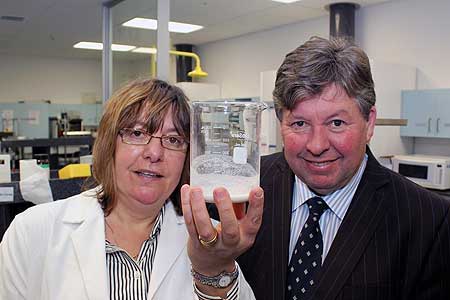Research: Calf supplement boosts milk production

Research carried out at New Zealand’s Massey University has resulted in the development of a calf supplement that can increase milk yield in dairy cows by up to 12%.
Dr Jean Margerison, a senior lecturer in Animal Nutrition and Lactation Physiology at the Institute of Food, Nutrition and Human Health and Major Leader of Animal Science, has been conducting research into the Queen of Calves calf nutrition programme over a number of years.
Dr Margerison has followed the development of groups of dairy cattle from birth through two years of milk production. She says cows raised on the dietary supplement grew faster and outperformed other animals when it came to milk production.
“It appears that adding plant carbohydrates – a non-fat energy source – to the diet early in life helps,” she says. “It leads to lean growth with minimal fat laid down in the developing mammary, which gets in the way of secretory tissue. It also affects cell signalling – fat cells that develop in the mammary actually inhibit the production of milk from secretory cells.”
After weaning the calves continue to graze and mature better than those not on the nutritional programme. “You want the dairy heifers to mate at 13-15 months to come into the dairy herd nine months later at 22 months of age at 85-90% mature weight so they can compete well with the existing adult animals. Currently most of New Zealand’s 22-month heifers have achieved 78% of their potential mature weight.
“It’s important they reach a good level of mature weight before joining the herd so they’re not trying to grow more than 10-15% of mature weight in their first lactation,” Dr Margerison says. “This often leads to the animal being pushed away from feed and becoming lame and infertile, which is a major problem in New Zealand dairy industry.”
Research has been carried out to perfect the formula, which now contains specific plant carbohydrates and amino acids that provide good lean growth through specific proteins, non-fat energy and minerals making up for some of the natural deficiencies found in milk.
“The animals raised on this diet at Massey’s number four dairy farm produced 12% more milk than the control group,” Dr Margerison says. “We also have data from industry and those figures show an 18% increase in milk yield.”
Dr Margerison said that the increase in growth rate is beyond what would be expected from the additional energy added, and that rheological studies indicated increased curd strength, which is an important factor in milk digestion, resulted from combining plant carbohydrates, amino acids and milk.
Institute head Professor Richard Archer says the research into Queen of Calves is a good example of how the University can work with industry to improve economic returns very directly. “Working with a company that already has the basis of a product, has manufacturing, distribution and brand already sorted out, provides a university with its most assured route to economic impact for research,” he says.
Dr Margerison presented the latest findings at the Joint American Animal Science and Dairy Science Association conference in New Orleans in July.
(Photo caption: Dr Jean Margerison with Queen of Calves chief executive Stephen Bell-Booth.)
Join 26,000+ subscribers
Subscribe to our newsletter to stay updated about all the need-to-know content in the feed sector, three times a week. Beheer
Beheer









 WP Admin
WP Admin  Bewerk bericht
Bewerk bericht